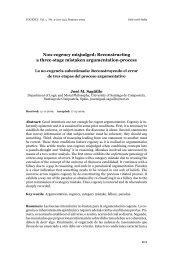Cogency v2 n2
Cogency v2 n2
Cogency v2 n2
Create successful ePaper yourself
Turn your PDF publications into a flip-book with our unique Google optimized e-Paper software.
COGENCY Vol. 2, N0. 2, Spring 2010<br />
is bald” looks like a normal subject-predicate proposition of the form S is P.<br />
But in fact in the analysis of it, which F.P. Ramsey termed “a paradigm of<br />
philosophy” (Ramsey, 1990: 1, n.1), it turns out that this proposition is really<br />
much more complex: it is an existential-proposition with three conjuncts.<br />
This important result comes ultimately from logic–not so much from the<br />
technical side as from the philosophical side–the attempt to understand<br />
and display logical form. The task of philosophical analysis is to “translate”<br />
proposition from its grammatical to it logical form.<br />
Thus to understand the subliming claim, we need to distinguish three<br />
different referents for the term “logic” that we find in the Investigations.<br />
Sometimes it refers to what might be called natural logic (NL)–the logic<br />
we employ in our everyday reasoning, introduced above.<br />
Sometimes “logic” refers to mathematical logic–the system of logic that<br />
was developed in the Principia Mathematica to show that mathematics is<br />
reducible to logic. Call this “ML.”<br />
Sometimes “logic” refers to the philosophical and logical views that arise<br />
out of reflection on ML, what I have called “philosophical logic: “PL” (see<br />
[PI] #108). The relation between these three is crucial, if we are to understand<br />
the claim about subliming.<br />
In my view, ML is not the sublimed logic, but the results obtained in ML<br />
made possible the set of views I have labeled PL–and this logic is the sublimed<br />
logic. For example, Russell’s solution to the problem of the definite<br />
description ultimately depends on the idea that there is such a thing as “the<br />
logical form of a proposition.” The notion of logical form is crucial to PL.<br />
Russell believed that grammatical form is misleading as to logical form and<br />
that the solution to the philosophical problems surrounding identity and<br />
the definite description requires this insight.<br />
Let me now say more about what is meant by the term “subliming” here.<br />
Subliming the logic of our language<br />
In (#89), Wittgenstein asks the question: “In what sense is logic something<br />
sublime?” First, as to the term “logic” here: my conjecture is that the logic<br />
being described as “sublime” is not the logic of the Principia Mathematica<br />
[viz., propositional logic, set theory, predicate logics, all of which I would<br />
90








